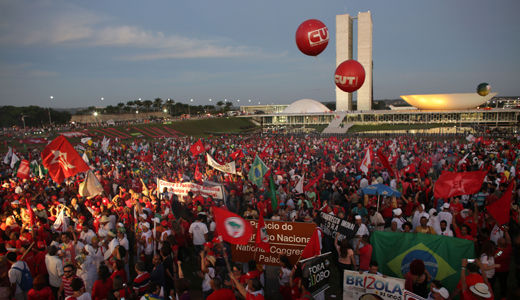
ITABUNA, Brazil — Last week over one million Brazilians took to the streets across the country to protest a pending right-wing coup against the government of President Dilma Rousseff. In Brasilia, the nation’s capital, some 150,000 people said “no” to the coup, shouting, “Stay Dilma!”
In the recent period, President Rousseff’s government has come under sharp attack from ruling class forces opposed to the government’s reforms. During her first term the Workers Party (PT), supported by both the Communist Party of Brazil (PCdoB) and center parties, lifted millions of Brazilians out of poverty through the federal government’s Bolsa Familia program initiated by former president Lula.
Millions of low-income Brazilians received housing through social programs like “My House, My Life” implemented by the Workers Party-led government.
In addition, the “More Doctors” program, aided by Cuba and other nations, has provided health care to populations in the most remote locations of the country. The program has been a huge success and has achieved the ideal target number of doctors per thousand inhabitants.
Earlier, during the Lula administration (2003-2010), the government implemented an education quota policy, (Brazil’s version of affirmative action) and thousands of black students enrolled in public universities, where once seats were occupied predominantly by white middle class and rich students.
To put it mildly these social policies displeased the elite and reactionary middle class.
These issues came to a head in the 2014 presidential elections which resulted in a small percentage difference between the two candidates who competed in the second round: Aécio Neves, candidate of the Party of Brazilian Social Democracy (PSDB) a neoliberal right-wing party, was supported by conservative and reactionary parties and won 48.36 percent of the votes. Dilma Rousseff, representing the Workers Party and supported by the Communist Party and centrists, was re-elected with 51.64 percent of the votes.
Rousseff then formed a coalition government bringing together the government’s center parties, the left and the Brazilian Democratic Movement Party (PMDB). The PMDB has the largest number of MPs in the House. Politically it can be defined as a centrist party, but is closely linked to conservative sectors, with a history of supporting those who are in power.
In the election’s aftermath a reactionary wave led by right-wing and fascist organizations opposed to the social programs implemented by Lula and Dilma Rousseff has intensified.
This reactionary wave has the mass media at its disposal including Globo TV, and magazines like Veja, and Isto é. These media outlets are the main means of forging popular discontent among those who have lost privileges due to the reduction of poverty and the admission of poor students to universities formerly accessible only to the rich.
Adding to this explosive mix a federal judge, Sergio Moro, through a police operation called “Lava Jato,” uncovered a corruption scandal involving former directors of a public company and members of various political parties, including the PSDB, the PMDB, PT, DEM, and private company directors.
Moro, whose father was the founder of the PSDB in one of Brazil’s states and whose wife is legal advisor to the PSDB, went on to share leaks of illegally taped conversations between former President Lula and President Rousseff, the purpose of which was to gain political capital and embarrass both.
Notwithstanding any sensitive issues revealed in the leaked conversations there is no evidence that incriminates Lula. Moreover, President Dilma Rousseff has not been charged with any crime and was not even mentioned by informants in operation Lava Jato.
Operation Lava Jato is not related to the impeachment being debated in the House of Representatives. Here the grounds for impeachment is that the president used accounting mechanisms called “cycling” for some of the government’s social programs.
This is not a crime: cycling is a legal practice used by many managers in Brazil and other countries to enable financial management.
Therefore, the process of impeachment against President Rousseff has the markings of a coup because according to the Constitution of the Brazilian Republic, to be impeached the president has to have committed a crime.
The PCdoB has been involved in the struggle against the coup because it understands it as an attack on democracy orchestrated by fascists and right-wing parties who have lost the last four presidential elections.
Today’s coup plotters are the same reactionary groups that gave the 1964 coup support from Globo, the Order of Attorneys of Brazil (OAB) and newspapers such as Folha de São Paulo.
During this period that lasted until 1985 communists, students, artists and intellectuals were arrested, tortured and killed for fighting for the return of democracy. Therefore, communists of PCdoB, PT members, students, intellectuals and social movements as well as artists have called upon Brazilians to mobilize against the coup and have occupied the streets since 2015 saying “Stay Dilma! There will be no coup!”
For this reason a Popular Front has been formed to mobilize the people to march in defense of democracy.
The first march against the coup was in February, 2015, then again in April, August and December, 2015.
There have been demonstrations in other countries including in Canada in front of the Brazilian embassy and in Portugal in front of the Faculty of Law of Lisbon. Brazilians welcome these displays of solidarity. Dilma was democratically elected with the support of social movements representing the working class and should remain in office to insure that the cause of Brazil’s workers moves forward. Democracy will not be amputated!
Video: Estudantes em marcha contra o golpe em Brasília no dia 31 de Março de 2016
Photo: Supporters of Brazil’s President Dilma Rousseff and former President Luiz Inacio Lula da Silva rally to support the leaders in Brasilia, Brazil, March 31, 2016. Eraldo Peres | AP

MOST POPULAR TODAY

Zionist organizations leading campaign to stop ceasefire resolutions in D.C. area


High Court essentially bans demonstrations, freedom of assembly in Deep South

Afghanistan’s socialist years: The promising future killed off by U.S. imperialism

Communist Karol Cariola elected president of Chile’s legislature






Comments